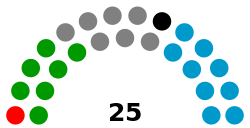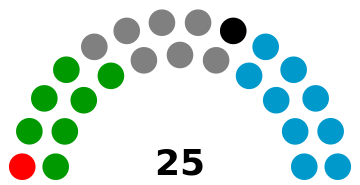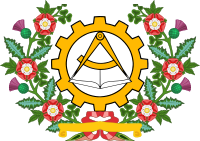Senate of the Gymnasium State
Senate of the Gymnasium State Senát Státu Gymnázium | |
|---|---|
 | |
| Type | |
| Type | |
| Leadership | |
vacant | |
vacant since 4 September 2023 | |
| Structure | |
| Seats | 25 |
 | |
Senate political groups | ORS: 9 SL: 7 SASSG: 1 GSSD: 1 ind.: 7 |
| Meeting place | |
| Sušice-Gympl, Gymnasium State online | |
Senate of the Gymnasium State (Czech: Senát Státu Gymnázium) is the official unicameral legislative and executive body of the Gymnasium State. The Constitution stipulates its name as the "Senate" (Czech: Senát). According to the constitution, the Senate exercises competences usual in parliamentary systems: it holds and passes bills, has the right to modify the Constitution and ratifies international agreements. Its powers were however assumed by the National Preservation Government after the 2023 Gymnasian coup d'état. Its members are all citizens of the Gymnasium State older than fifteen years. The official seat of the Senate is in Sušice-Gympl, but large portion of its activities took place online.
History
The modern Senate was only created by the second constitution on 13 February 2019, but a similar institution has existed continuously since the independence of the Gymnasium State, first as the Council and later the Government. Since 2023, the Senate is suspended.
Council
The first legislative body in the Gymnasium State was the Council of Socialist State of Gymnasium (Rada Socialistického státu Gymnázium), which also held the executive power. It was also considered the collective head of state. It was officially created on 1 September 2017, but first convened only on 4 September, when the four initial members retroactively confirmed its establishment. All citizens of the Socialist State were members of the Council with equal votes, meaning the Council grew from four initial members to eleven at the time of adoption of the Provisional Constitution. The Council usually convened in the hallways of the gymnasium, most often in the armchairs near the biology classroom, and therefore outside of the claimed territory. For most of the duration of the Socialist State the Council was inactive.
Government
The renewed interest in the micronation near the end of 2017 led the now larger Council discussing a new form of governance, which would encourage more participation from the larger population. The Provisional Constitution passed on 10 December granted the representative function and status of the head of state to the President and transformed the Council into the new Government of the Gymnasium State (Vláda Státu Gymnázium), which kept the Council's legislative powers. The Government was headed by the Prime Minister, and assigned all citizens over the age of 13 a ministry of their choice, which they were then responsible for. The full list of ministries, including ministries established later, was:
- Ministry of Agriculture (Ministerstvo zemědělství)
- Ministry of Culture (Ministerstvo kultury)
- Ministry of Defence (Ministerstvo obrany)
- Ministry of Education (Ministerstvo školství)
- Ministry of Environment (Ministerstvo životního prostředí)
- Ministry of Finance (Ministerstvo financí)
- Ministry of Foreign Affairs (Ministerstvo zahraničních věcí)
- Ministry of Fun (Ministerstvo zábavy)
- Ministry of Health (Ministerstvo zdravotnictví)
- Ministry of Information (Ministerstvo informací, until 1 June 2018 known as Ministry of Journalism, Ministerstvo zpravodajství)
- Ministry of Infrastructure (Ministerstvo infrastruktury)
- Ministry of Interior (Ministerstvo vnitra)
- Ministry of (Nuclear) Industry (Ministerstvo (jaderného) průmyslu)
- Ministry of Publicity (Ministerstvo propagace)
- Ministry of Social Affairs (Ministerstvo sociálních věcí)
- Ministry of Sport (Ministerstvo sportu)
- Ministry of Trade (Ministerstvo obchodu)
- Ministry of Transport (Ministerstvo dopravy)
The Provisional Constitution contained a few articles regarding changes in portfolios, including the controversial Article 6, which, contrary to the Council's resolution, stated all ministerial positions would change together with elections for the President and Prime Minister. The article was later removed, but the Provisional Constitution still allowed for the Prime Minister to reshuffle the entire government. The new constitution from February 2018 replaced the Provisional Constitution, and replaced most of its contents. The age restriction for membership in the Government was relaxed and removed any possibilities for large reshuffles, only allowing for portfolio changes of individual ministers.
The Government mostly convened during lunch breaks either in the school canteen of nearby Lerchova elementary school or the gymnasium's own school buffet, but would also often in the main classroom of majority of the citizens. Though the meetings were productive in terms of exercising the legislative powers, the ministries were often critised as only a few ministries held actual powers while the majority had virtually no power. This arrangement was accepted by a large portion of the population, which did not want too many responsibilities, but a number of more ambitious politicians led by Joel Novotný called for a reform. Though the ministries were disestablished by the second constitution, many still look back to them with nostalgia.
Senate
The Senate was created by the second constitution in February 2019, replacing the Government as the national legislature as well as reassuming the executive branch from the dissolved ministries. This change left the Prime Minister, or Premier as the position was called since, as head of government only in name and left it only for representation similar to the President. An amendment from October 2019 reintroduced the minimum age for holding a seat in the Senate, and in July 2020 a logo inspired by the main entrance to the gymnasium was adopted. The Senate convened in the main classroom of the majority of the citizens, which would move in September 2019, but with a growing number of citizens from farther regions most of the Senate votings switched to an online form, distributed using email and Messenger, which was later mostly abandoned and moved to Discord. This led to an issue, when foreign Gymnazists were unable to vote during Senate voting that took place in person, while the mainland Gymnazists rarely participated in the online votings. This was even more apparent during the COVID-19 pandemic, when in-person were largely impossible and turnout for Senate votings dropped among both foreign and mainland citizens, often so low that a proposal could not pass and had to be resubmitted. Due to this, almost no proposals were even submitted starting with the second half of 2021. Calls for a reform have also reappeared, with the two main proposals being introduction of smaller comittees responsible for executive powers in the scope assigned to them by Adam Pivetz of the Civic Republican Party or the reintroduction of an executive government headed by the Premier consisting of a smaller number of partisan ministers by Branko Stanacev of the Gymnasium Reform Party. On 4 September 2023, the Senate was suspended (but not dissolved) by the National Preservation Government, which claimed its powers in the 2023 Gymnasian coup d'état.
Composition
As per the constitution and its amendments, all citizens of the Gymnasium State over the age of 15 hold a seat in the Senate. The only way to relinquish the seat is by relinquishing the citizenship. The member of the Senate is called a Senator. As of June 2023, there are 25 Senators. All four political parties of the micronation have at least one seat in the Senate, but no party has a majority. Because of the 2022 census, a number of Senators had their voting right suspended and later their citizenship terminated because they did not participate in time, including the members of the Gymnasium Reform Party. Because of this, the Civic Republican Party also achieved plurality in the Senate.

| |
9 / 25
| |
7 / 25
| |
1 / 25
| |
1 / 25
| |
| Independent politicians | 7 / 25
|
Powers
This section is empty. You can help by adding to it. |
